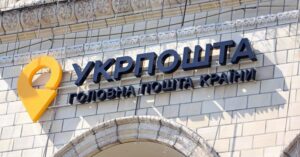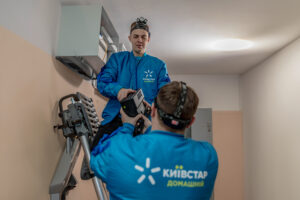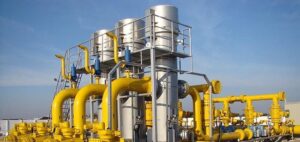
Ukrposhta JSC’s investments in development in 2024 will amount to about UAH 1.3 billion of its own funds, the company’s CEO Igor Smelyansky said at the Forbes Ukraine Business Breakfast on Wednesday.
According to him, the investments will be directed to the organization of container exchange with the transportation of goods by large-sized transport, due to the growth of parcel shipments. Investments in the creation of container exchange capabilities on the basis of one branch amount to UAH 100 thousand, Smelyansky said.
In addition, in 2024, Ukrposhta plans to buy a letter sorting machine. The machine will sort up to 50 thousand letters per hour using the QR code of an electronic stamp. The unit will be purchased with credit funds, the company’s CEO said.
“Ukrposhta plans to open another 300 post offices in Ukraine “to make the coverage as we want it to be.”
The branches will be opened in Kyiv, Odesa, and Dnipro, Smelyansky said.
According to him, Ukrposhta will open 18 new sorting facilities in the next four months, and a sorting center in Lviv will start operating in two weeks.
At the same time, Ukrposhta will not develop the oversized cargo business due to the high costs of further delivery of goods related to taxes.
Ukrposhta’s CEO emphasized that the company has not abandoned the idea of acquiring the bank. According to him, the effect of the transfer of PINbank to the company will amount to UAH 5 billion over three years.
“We will reduce budget expenditures on pension delivery by UAH 5 billion over three years,” Smelyansky said.

Italian export credit agency SACE will allocate EUR1.5bn to support trade and financial operations, particularly in the health care and infrastructure sectors.
According to the website of the Ministry of Economy of Ukraine, this was discussed during the meeting between the First Vice Prime Minister of Ukraine – Minister of Economy of Ukraine Yulia Sviridenko and Ambassador Extraordinary and Plenipotentiary of the Italian Republic to Ukraine Pier Francesco Dzadzo, where the Ukrainian side urged SACE to strengthen cooperation with Ukraine and expand the types of covered risks.
In addition, the export credit agency intends to support investments of Italian companies in Ukraine and provide export credits, soft loans and direct investments.
First Deputy Prime Minister noted the importance of supporting Ukrainian small and medium-sized enterprises (SMEs), which is the backbone of the national economy. She stressed that the Government also expects to intensify cooperation with the Italian Agency for Cooperation Development (AICS) to promote local economic development, job creation and support SMEs.
In addition, the sides discussed the return of Ukrainians. The provision of housing for Ukrainians remains important.
SACE is an Italian export credit agency and an active participant of the largest international organizations in the field of export credit. SACE’s activities are regulated by European Union legislation and the OECD Agreement on Officially Supported Export Credits.
AGENCY, INVESTMENTS, ITALY, Ministries of Economy, trade support

Kyivstar, Ukraine’s largest Internet provider by subscribers, continues to secure its Home Internet service in case of power outages. In 2023, the company invested more than UAH 200 million to provide uninterruptible power supplies for Home Internet. It will invest an additional UAH 50-70 million by the end of February 2024. The provider also continues to actively launch GPON Internet in different cities of Ukraine.
Kyivstar employees started connecting the Home Internet network to uninterruptible power supplies (UPS) in October 2022 and will continue to do so to provide 700 thousand subscribers with Internet access even in the event of a power outage. This modernization will allow the Home Internet network to operate in the absence of power for up to 5 hours.
In total, the service users will be provided with equipment for uninterrupted operation in 44 cities of Ukraine. In total, the provider plans to cover more than 22.3 thousand addresses where UPS will be installed. 180 specialists are involved in the process of installing, checking and testing equipment throughout Ukraine.
Kyivstar also started connecting the Internet using GPON technology at the end of 2023. In 2024, the company plans to partially modernize and replace existing technologies with GPON in some cities. This connection technology is more energy efficient.
“In the context of short- and medium-term outages, GPON can provide consumers with Internet access for longer, including because we build lines from base stations with mobile diesel generators. And as long as we have the human resources and the ability to supply fuel and components to keep the generator running at the base station, users connected via GPON technology will have the Internet signal,” commented Sergiy Sukhoruk, Head of Fixed Line Communications.
About Kyivstar
Kyivstar is Ukraine’s largest electronic communications operator, serving more than 24 million mobile subscribers and more than 1.1 million Home Internet subscribers as of September 2023. The company provides services using a wide range of mobile and fixed technologies, including 4G, Big Data, Cloud solutions, cybersecurity services, digital TV, etc. Kyivstar helps subscribers, society and the country to overcome the challenges of wartime. Since the beginning of the full-scale war, the company has allocated more than UAH 1.4 billion in aid for the humanitarian needs of the Armed Forces, society and subscribers. Kyivstar’s sole shareholder is the international VEON Group (headquartered in the Netherlands). The Group’s shares are listed on NASDAQ (New York) and Euronext (Amsterdam). Kyivstar has been operating in Ukraine for 25 years and is recognized as the largest taxpayer in the telecom market, the best employer and a socially responsible company.
ENERGY INDEPENDENCE, GPON, Home Internet, INVESTMENTS, KYIVSTAR

The NOVA Group, which includes the largest logistics operator Nova Poshta, invested UAH 5.3 billion in Ukraine in 2023, which is 2.5 times higher than the investment budget for 2022 (UAH 2.1 billion), the group said in a statement on Thursday.
“The level of Nova Poshta’s faith in the future of Ukraine in 2024 is even higher: this year it is planned to increase the amount of investments to UAH 7 billion,” the release said.
According to the release, last year NOVA also increased its tax payments by one and a half times to UAH 10.7 billion. It is specified that, in particular, Nova Poshta paid UAH 8.7 billion in taxes, and NovaPay paid UAH 1.2 billion.
The report indicates that last year, the largest amount of capital investment – UAH 2.4 billion – was directed to the construction of new sorting terminals and automation of those already in operation. It is noted that this allows the company to ensure an uninterrupted delivery process in the face of constant growth in cargo volumes and not lose speed: today the company delivers 1040 parcels every minute, and on peak loading days – 1400.
Another major expense item, according to the release, is the development of the network of branches and post offices for the purpose of walking distance accessibility, in which UAH 1.1 billion was invested. As a result, Nova Poshta’s network in Ukraine already includes more than 27 thousand service points.
Also, the investment budget of UAH 1.2 billion was used to automate workplaces and repair branches to make them convenient and barrier-free for different groups of consumers and employees.
It is specified that in 2023, UAH 233 million was spent on the renewal of the fleet of transport and BDF containers, UAH 338 million on IT and R&D, and UAH 17 million on the development of the fulfillment business.

In the first half of 2023, Naftogazvydobuvannya, the main production asset of DTEK Oil&Gas, increased investments in gas production development by 35% to almost UAH 1 billion amid a decline in financial performance compared to the same period of the previous year.
According to the company’s report on the stock exchange, the company continued to invest in development despite a 66% decrease in DTEK Oil&Gas’ net profit (to UAH 2.38 billion) and a 31.5% decrease in revenue (to UAH 13.11 billion) in the first half of 2023 compared to the same period last year.
It is noted that the funds were used to increase the drilling and exploration program to return to production growth in the medium term.
The company also reported that it paid more than UAH 5 billion in taxes to the state budget, including more than UAH 2.2 billion in rent for the use of subsoil, part of which (5%) is directed to local budgets.
DTEK Oil&Gas explained the decline in financial performance by the fall in gas prices in the 2023 market.
“In the first half of 2023, the main production asset of DTEK Oil&Gas increased its investments in gas production development by 35%. Last year, due to problems with gas sales, we were forced to reduce our drilling program. This year, the company is focusing on increasing the volume of drilling operations. In the next 2-3 years, this will allow us to return to the growth dynamics to further strengthen Ukraine’s energy security,” the company commented.
“DTEK Oil&Gas is the largest private gas producer in Ukraine. Its portfolio of assets includes Naftogazvydobuvannya and Naftogazrazrabotka, which are engaged in exploration and production of hydrocarbons in three license areas in Poltava and Kharkiv regions.
As reported, DTEK Oil&Gas increased its net profit by 70.6% to UAH 11.46 billion in 2022, with revenue growing 2.2 times to UAH 36.00 billion.

Aid to Ukraine is very different from other humanitarian projects and should largely be aimed at helping to develop private businesses and stimulating investment, Norwegian Foreign Minister Anniken Huitfeldt said at Ukraine Recovery Conference in London on Wednesday.
“When providing the assistance to Ukraine, we must make sure that local businesses will benefit. Therefore, we announced a donation of EUR 25 million to provide more insurances and guarantee mechanisms so that companies are willing to invest,” she said.
Huitfeldt said this is part of the Norwegian program worth EUR 7 billion for Ukraine.
She also noted the importance of a sound legal system, commitment to fighting corruption and burden-sharing when it comes to investment risk, and cited the decentralization reform as positive.
Earlier at the conference, Vice-President of the European Commission Valdis Dombrovskis announced the signing on that day of an agreement to launch an experimental military insurance scheme. He said the EU is also working on a pilot project for export credit guarantee schemes to Ukraine.